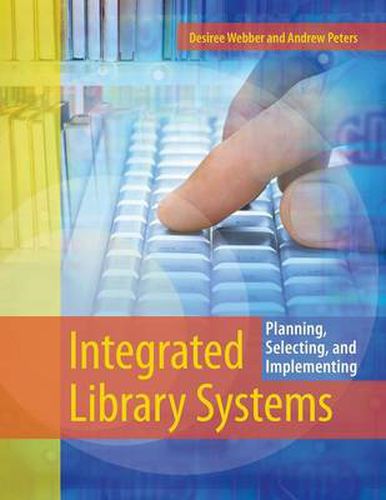Readings Newsletter
Become a Readings Member to make your shopping experience even easier.
Sign in or sign up for free!
You’re not far away from qualifying for FREE standard shipping within Australia
You’ve qualified for FREE standard shipping within Australia
The cart is loading…






This book offers everything you need to know about selecting and implementing the best integrated library system (ILS) for your library, whether you purchase and install it yourself or hire a consultant to assist you.
This is the book you’ve been waiting for. Integrated Library Systems: Planning, Selecting, and Implementing is an all-inclusive guide to acquiring a new ILS. Detailed and practical, the book covers every step of the process, from cost-benefit analysis, to evaluating software, writing the request for proposal, and implementation and training.
You’ll learn about different types of integrated library systems-standalone, turnkey, hosted, software-as-a-service (cloud computing), and open-source-and how to assess your facility and staff to find the best fit. The book also covers evaluation of software and hardware; third-party add-ons, such as RFID; and writing successful budget proposals and justification statements. There is even specific, headache-saving advice on working with sales reps, such as the warning not to ever accept the statement: The vendor will not be held accountable to the contents of the RFP. Even if you’re working with a consultant, this book will help you understand the process and make informed decisions.
A cost-benefit analysis worksheet to assist in selecting the best type of system
A chart of ILS vendors with types of systems sold and a price comparison grid
Time-saving forms, worksheets, and sample plans to assist the reader through the process
A start-to-finish timeline for an integrated library system project
A glossary of key terms such as cloud computing,
DMZ, and Gap file
A bibliography of books, journal articles and websites covering integrated library systems, strategic planning, technology, technology planning, and related topics, such as negotiating contracts with library system vendors
$9.00 standard shipping within Australia
FREE standard shipping within Australia for orders over $100.00
Express & International shipping calculated at checkout
This book offers everything you need to know about selecting and implementing the best integrated library system (ILS) for your library, whether you purchase and install it yourself or hire a consultant to assist you.
This is the book you’ve been waiting for. Integrated Library Systems: Planning, Selecting, and Implementing is an all-inclusive guide to acquiring a new ILS. Detailed and practical, the book covers every step of the process, from cost-benefit analysis, to evaluating software, writing the request for proposal, and implementation and training.
You’ll learn about different types of integrated library systems-standalone, turnkey, hosted, software-as-a-service (cloud computing), and open-source-and how to assess your facility and staff to find the best fit. The book also covers evaluation of software and hardware; third-party add-ons, such as RFID; and writing successful budget proposals and justification statements. There is even specific, headache-saving advice on working with sales reps, such as the warning not to ever accept the statement: The vendor will not be held accountable to the contents of the RFP. Even if you’re working with a consultant, this book will help you understand the process and make informed decisions.
A cost-benefit analysis worksheet to assist in selecting the best type of system
A chart of ILS vendors with types of systems sold and a price comparison grid
Time-saving forms, worksheets, and sample plans to assist the reader through the process
A start-to-finish timeline for an integrated library system project
A glossary of key terms such as cloud computing,
DMZ, and Gap file
A bibliography of books, journal articles and websites covering integrated library systems, strategic planning, technology, technology planning, and related topics, such as negotiating contracts with library system vendors